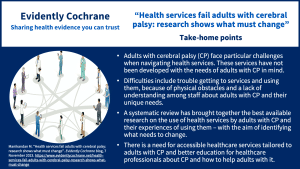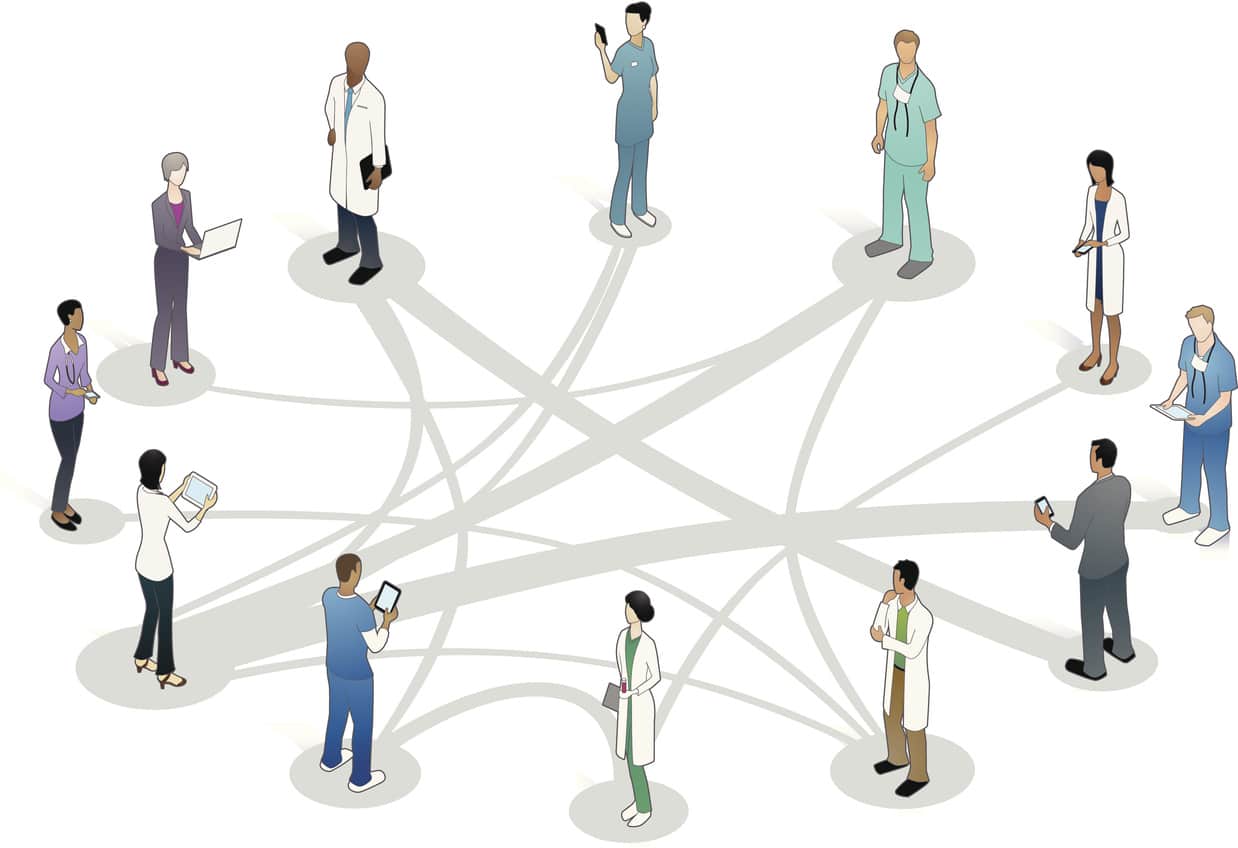In this blog written for both healthcare professionals and adults with cerebral palsy (CP), researcher Dr Manjula Manikandan and her team explain their recent research about how health services are failing adults with cerebral palsy – and what needs to change.

Healthcare services are failing adults with cerebral palsy – and this needs to change.
To understand what’s going wrong and what needs to happen, our research team has brought together the best available research on the use of healthcare services by adults with cerebral palsy (CP) and their experiences of using them. It highlighted many ways in which our healthcare services need to improve. We hope that shedding some light on the current problems will help those delivering health services to improve services provided for adults with CP.
Cerebral palsy (CP) is caused by a problem with the brain that develops before, during or soon after birth. This brain injury does not worsen as the child grows, but leads to lasting difficulties with moving and holding the body in certain positions. This can make it challenging for a person to do certain activities.
While CP was once thought of as a childhood condition, people with CP grow up and become adults. Into adulthood, people with CP may have pain, get tired easily, find it harder to do certain daily activities, and be more prone to accidents like falling. Adults with CP are also more likely to have health problems such as depression, high blood pressure, heart disease, stroke, asthma or osteoarthritis (Ryan et al 2023). To help people with CP manage the unique challenges that may come with ageing, it is important for healthcare services to continue providing support.
Éabha Wall, aged 28, who has CP commented that “when people think about CP they picture small children. These small children grow to become adults who need support in place to lead an independent life. It’s 2023 and adults with CP have to rely heavily on self-advocacy and anecdotal evidence because there is such a lack of understanding in research into ageing with CP.”
Our research drew on studies with over 14,000 people with CP. Many people of different backgrounds, ages and genders contributed. Everyone had a different story, but the research revealed that many adults with CP experience similar barriers and challenges when navigating health care.
What health services do adults with cerebral palsy (CP) use?
Adults with CP use different healthcare services depending on their needs. Our research found that most of them visit their regular doctors, called general practitioners (GPs). In a year, 84% of adults with CP see their GPs. A recent report, Each and Every Need, found that children with CP visit their family doctors less often than adults with CP. In the UK, about half of people with CP transition from children’s services to their GP as there are no specialized services for adults with CP. This lack of healthcare specialists for adults with CP might be why they end up relying more on GPs.
Alongside specialist healthcare for CP-related symptoms, most adults with CP need to use the wide range of healthcare professionals seen by people without CP. After GPs, dentists are the next most visited by 65% of adults with CP, followed by physiotherapists at 44%. This variety in healthcare usage highlights that adults with CP may have broad and varied needs when it comes to their healthcare.
Adults with cerebral palsy: what are their experiences of using health services?
The research revealed that the challenges facing adults with CP accessing health services are many and varied. Here are some of the barriers they face:
Transition challenges faced by adults with cerebral palsy
Moving from children’s to adult services can be tough for those with CP, with abrupt changes causing emotional stress. One person with CP commented:
“The word abandonment is exactly how I feel. I feel like ‘they’ just took us and just threw us out there to an adult provider”- DiFazio et al, Pg. 22
Young adults often felt unprepared and anxious. Other challenges in moving from children’s to adult services included finding appropriately trained healthcare professionals and poor coordination between service providers. Transition often requires dealing with bureaucracy, and self-advocacy (speaking up for yourself and your needs) from people with CP.
Access – the ability to access health services
Adults with CP often have a hard time when they use healthcare services because the places they go to for help may be inaccessible. For example, the facility may not have the right equipment, like tables that can be adjusted, or scales that work with wheelchairs. The number of accessible rooms and facilities may be insufficient. This makes it seem like healthcare services aren’t set up for people who use wheelchairs or other mobility devices. As one person with CP commented:
“You don’t have access to a high–low examining table, so you are too frightened to get a Pap [smear test] because you feel you are going to fall off the table.”- Scheer et al, Pg. 225.
Sometimes, it’s tough for them to get to these places because of problems with transport and costs.
People who support adults with cerebral palsy: collaborative roles and responsibilities
People supporting adults with CP often felt obligated to provide care in the absence of professional support, which could be physically and emotionally challenging. They usually accompanied adults to healthcare appointments, and had to strike a balance between promoting independence and providing assistance. Support people frequently advocated for the needs of the adults they supported and worked closely with healthcare staff, though this collaboration could sometimes be challenging. One parent commented:
“I learned that she has one advocate . . . She has no one’s voice but mine and if I don’t get loud and I don’t act boldly on her behalf, no one will. You need to trust your gut as a caregiver and mom.”- Burkhard et al 2013, Pg. 360
Managing the lack of CP-specific expertise of healthcare providers presented difficulties, and caregivers acknowledged that the hospital setting was especially demanding for adults with CP with specific requirements.
Lack of specialised knowledge impacts on service provision
Healthcare providers might not know how to deal with the challenges that come with CP as people get older and this can be really frustrating. Sometimes, this lack of knowledge leads to the wrong treatmentSomething done with the aim of improving health or relieving suffering. For example, medicines, surgery, psychological and physical therapies, diet and exercise changes. or getting conflicting advice from different healthcare workers. Some providers also seem like they don’t want to learn from adults with CP, which is frustrating for both the patients and their caregivers.
When healthcare workers make assumptions about adults with disabilities, it can impact the care they give and their relationship with the individual:
“The thing is too I think they see people in a wheelchair and they immediately think that they don’t have a brain”- Hemsley et al 2008, Pg. 263
Health system challenges faced by adults with cerebral palsy
Adults with CP and the people who support them can find it hard to navigate different parts of the healthcare system because the parts are not well connected. Sometimes, the people involved in their care in hospital and in the community don’t talk to each other, and adults with CP and people who support them aren’t part of decisions about their healthcare. This lack of care coordination makes it tough for people to get the healthcare they need:
“One is doing their thing and the other one is doing theirs, and there’s no communication between them about what’s going on . . . but they don’t follow-up . . . there’s no-cross communication between them about what’s going on”- Kroll et al 2003, P. 1111
How can we improve health services for adults with cerebral palsy?
The most important thing this research has revealed is that change is needed. To improve health care for adults with CP, we need a team of experts from different fields to work together and provide coordinated care throughout their lives. This starts by listening to and engaging with people with CP and their caregivers. Healthcare providers need to learn how to understand and meet the specific needs of adults with CP. We can and should change how the healthcare system works to make it easier for adults with CP to access the care they need.
Our research identified gaps in how health care is provided to most people with CP. These problems affect everyone with CP and make life challenging. The hope of this research is to close these gaps. This is a first step towards making services better for them. Our findings are in line with the latest guidance from NICE (National Institute for Health and Care Excellence), an organisation that helps make healthcare better in the UK. We have shown how important it is for experts to work together to provide care and have been reminded that health care should be easy for everyone to use, including people with CP.
Find out more and get involved
Adults with CP and healthcare professionals can find more information about our ongoing research on our CP-Life Centre website [www.CP-LifeCentre.ie]. You can also contact us and indicate your interest in participating in our upcoming research projects.
With thanks to Éabha Wall for her contributions to the blog.
Join in the conversation on Twitter with @Manjula_M_K_N @CochraneUK or leave a comment on the blog.
Please note, we cannot give specific medical advice and do not publish comments that link to individual pages requesting donations or to commercial sites, or appear to endorse commercial products. We welcome diverse views and encourage discussion but we ask that comments are respectful and reserve the right to not publish any we consider offensive. Cochrane UK does not fact check – or endorse – readers’ comments, including any treatments mentioned.
Manjula Manikandan is a mentee on the 2023 Communicating with the Public scheme facilitated by Evidence Synthesis Ireland.



[…] Read the blog on the Evidently Cochrane website. […]